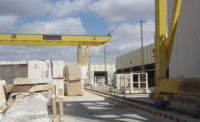
(This picture and the next) Rolling Rock Building Stone, Inc. was started by Homer Weller in November of 1955. Today the company operates four quarries, including one for fieldstone and split fieldstone that is located at the main headquarters in Boyertown, PA. Photos by Michael Reis, except where noted
With a vision and determination, Homer Weller set out to start Rolling Rock Building Stone, Inc. in Boyertown, PA, in November of 1955. At the time, the company specialized in quarrying building stone locally from a site in Berks County. Today, Rolling Rock has expanded to include four quarries - three of which it owns - and has also become a well-known producer of thin stone veneer.
“We have diversified over the years,” said Company President Gary L. Weller. “As sales expanded, we started to carry more products.” Currently, approximately 40% of sales result from the company’s own products. Additional material offered comes from across the U.S. as well as Asia, Brazil, Canada and Mexico. “We buy anything from raw blocks to semi-finished and finished material,” said Weller. “It is the full spectrum.”

The quarries
The quartzitic sandstone quarry at Rolling Rock’s headquarters in Boyertown is the largest producer of the company’s four sites. It sits on 129 acres, of which 75 acres are being actively used. “We own 600 acres - the majority of which is ‘Clean and Green’ land dedicated to remain permanent forest,” said Terrence Meck, Executive Sales Manager. “There are a lot of woodlands for a buffer, and it controls the noise and dust. We are pretty concealed from the road.”In total, about 10,000 tons of quartzitic sandstone are quarried annually. “We get at least 12 different products out of Berks County,” said Meck, explaining that the fieldstone and split fieldstone products are then offered in an assortment of shapes and sizes. “It is amazing how many flavors you can get out of a few varieties.”
Also in Pennsylvania is a company-operated quarry in Schuylkill County, which also produces quartizic sandstone. “We have a long-term lease on this quarry and have been operating it for 10 years,” said Weller. “We can range from 5,000 to 7,200 tons each year. This year, we controlled it at 5,000.”
Additionally, Rolling Rock owns two quarries near Watertown, NY, which it operates under a sister company named Greystone Quarries. The quarries are approximately 300 miles from the Pennsylvania operation, and typically yield about 4,000 tons per year.
The company purchased one of the sites, which is mined from the Pamelia Formation and primarily produces limestone, 10 years ago, and the other one, which is part of the Potsdam Sandstone Foundation, is a sandstone quarry that was purchased five years ago. “The primary reason we bought the limestone quarry is because we saw a value in it,” said Meck. “It matches the regional Pennsylvania limestone.”
Meck went on to explain that they recently supplied the limestone for a science building at Wilson College in Chambersburg, PA. “Our limestone has a weathered patina to it when it comes out of the quarry,” he said. “It really works well. At Wilson College, all of the local limestone [on the existing buildings] is weathered, so our limestone was a nice match.”
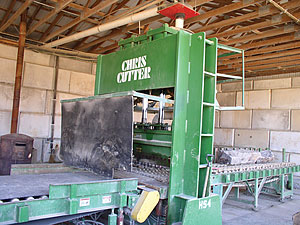
Blocks are split with two Chris Cutters from Cee-Jay Tool of Loveland, CO.
The production process
According to Meck, no blasting is used as a method of extraction in any of the company’s four quarries. “Our Pennsylvania quarries use an excavator to extract stone and our New York operations use an excavator equipped with a hydraulic hammer to free the stone to be processed.”To transport stone pieces around the site, the company has 12 haul trucks and a fleet of backhoes and front loaders. Additionally, there are 12 delivery trucks.
After being excavated, stone pieces are then placed on a picking conveyor and then go through a screener to get fine dirt out before being hand sorted for quality and texture. “Larger material goes through a splitter, which gives it a totally different look,” said Meck. “The colors are brighter.”
Weller explained that the hand-sorted fieldstone products fall into three categories. “Our staple has always been full-thickness building stone,” he said. “We have been selling thin veneer since 1990, and it is growing steadily. We also have landscape products.”
As the environment is very important to Rolling Rock, it maintains a tree planting program each year for reclamation. “Our plan is to reforest when we are done,” said Weller. “We always plant when we are finished and before moving to the next spot. I buy better trees than the Commonwealth of Pennsylvania program provides. We diversify the tree species so if one gets diseased, they all won’t.”
Rolling Rock’s quarries are equipped with state-of-the-art equipment that results in a quality and efficient production process. Presently, the company owns four ThinStone TXS 4500 thin stone sawing systems from Park Industries of St. Cloud, MN. Additionally, its facility houses two Hydrasplit® stone splitters and a Jaguar II bridge saw - all from Park Industries - as well as two Chris Cutters from Cee-Jay Tool of Loveland, CO, and the company’s most recent investment, a Steinex splitter with a 20-inch diameter cutting blade.
“We use different machines because each is good for a specific product,” explained Meck. “The thin stone saws from Park are so good that we don’t have to be so tentative with them. The Hydrasplit is good for quick cutting bigger stone, and the Steinex is a very nice machine for small pieces.”
According to Meck, all machinery and tools in the shops are run with generators. Also, a Kaeser air compressor is in place.

Two Hydrasplit® stone splitters from Park Industries of St. Cloud, MN, are also used in the production process. “We use different machines because each is good for a specific product,” explained Terrence Meck. “The Hydrasplit is good for quick cutting bigger stone.”
Quality control
After being cut and processed, the pieces are sent to a packaging area to go through quality control. “We have more than 40 different products being packaged,” said Meck. “Everything in the package is recyclable, including the plastic and wood.”Having a solid quality-control system goes hand-in-hand with maintaining a good team of workers from our local community. “We maintain a stable employment, which helps prevent turnover and keeps the quality of the employees,” said Meck, adding that the company has a staff of 50. “We are probably the few people in the industry to keep employees intact through the winter. In the winter, we work to get production ready for the spring.
“We try to keep everyone very versatile,” Meck went on to say. “We have a lot of truck drivers that have come from the quarry or were production workers. On average, the tenure of employees is over 15 years. Right now, we have the experience.”
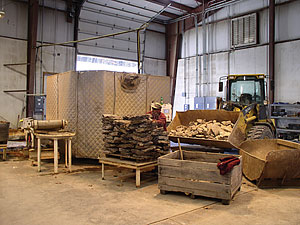
The thin veneer pieces are cut on four ThinStone TXS 4500 thin stone cutting systems from Park Industries. “We have been selling thin veneer since 1990, and it is growing steadily,” said Company President Gary L. Weller.
Marketing its products
In 2006, Rolling Rock’s stone showroom was completed. “We decided to make the commitment to show thin stone veneer,” said Meck.As 85 to 90% of the company’s business is residential work, the elegant 2,000-square-foot space is designed to illustrate different stone applications in various spaces of a home. There is a foyer that features both an informal rustic fireplace and a more formal fireplace as well as a breakfast nook and dining room. “We have a little bit of everything,” said Meck, adding that there is a separate room where finishes and trim pieces are displayed.
The majority of Rolling Rock’s products are sold in the Greater Philadelphia area. “We do sell direct in areas of the country where we do not have representation with authorized resellers,” said Weller. “Where we are represented, we endeavor to team up and assist architects and resellers to procure projects. Our national sales team takes care of the distributor relationships. We have several hundred authorized resellers scattered around the country.”
“We were pleased to ship product to Nebraska last year,” said Meck. “We are also working on a residential project in Idaho. Where we do not have representation, we do get directly involved with the contractor if it is a sizeable enough project.”
Currently, Rolling Rock, represented by Frederick Block Brick & Stone, is finishing up a large commercial project in Virginia. The company is supplying 40,000 square feet of thin stone veneer for the Martha Jefferson Hospital.
Another outlet for the company is reclaimed stone products. It maintains an extensive yard of some interesting pieces on its premises. “We are doing more and more with reclaimed products,” said Weller. “There is a wealth of reclaimed sandstone, limestone and granite pieces coming out of China.”
Among some of the pieces in Rolling Rock’s reclaimed stone inventory are antique water troughs from domestic and international sources and reclaimed granite curbstones and cobblestones from Philadelphia. Some of the reclaimed cobblestone was used to create a test track for the Toyota Tacoma in Tijuana, Mexico.
Moreover, there are domestic millstones. “The nice thing about these pieces is that we have the history on each one,” said Weller. “We know where each mill came from.”
Remembering its foundation
Homer Weller passed away on January 31, 2006. As a driven man who was devoted to the business that he watched flourish through the years, he worked almost until the end. As a result, family members and other company workers built a Memory Garden to always remember the love Weller had for the business.The beautiful garden includes a mortarless stone bridge, and some original tools used in the quarries are placed throughout the area. Additionally, the flagstone used is a quartzite from New York and there are boulders that are indigenous to Berks County. “We built the Memory Garden in 2006 for Homer and other members of the industry, said Meck.
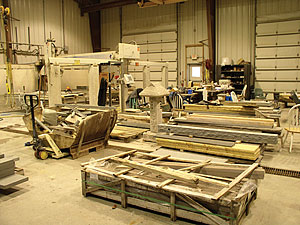
One area of the facility is designated for custom work, and it is equipped with a Park Industries Jaguar II bridge saw.
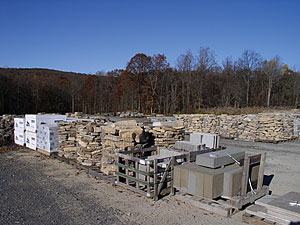
A typical order for one of the company’s several hundred resellers consists of a mix of products to meet many customer requests.
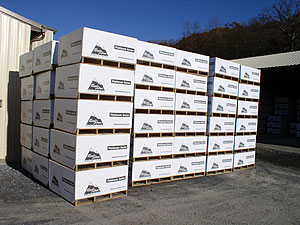
The company uses eco-friendly packaging for its stone products.
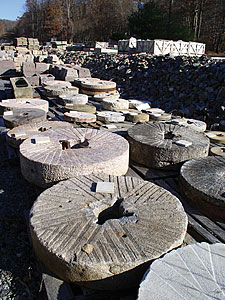
Another outlet for Rolling Rock is reclaimed stone products. The company maintains an extensive yard of some interesting pieces on its premises. “We are doing more and more with reclaimed products,” said Weller, adding that they have a significant amount of domestic millstones. “The nice thing about these pieces is that we have the history on each one,” said Weller. “We know where each mill came from.”

As the environment is very important to Rolling Rock, it maintains a tree planting program each year for reclamation. “Our plan is to reforest when we are done,” said Weller. “We always plant when we are finished and before moving to the next spot.” (An example of reclamation can be seen where the light green trees are located on the right side of this photo.)
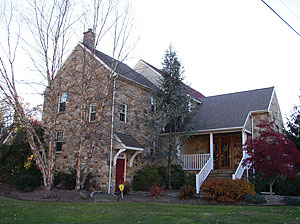
The company’s head office operates in an expanded “homestead.” The 1999 addition utilizes 6-inch-thick building stone, while the original building is comprised of structural walls that are approximately 24 inches thick.
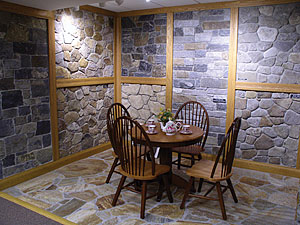
(This picture and the next two) In 2006, Rolling Rock’s stone showroom was completed. “We decided to make the commitment to show thin stone veneer,” said Meck. As 85 to 90% of the company’s business is residential work, the elegant 2,000-square-foot space is designed to illustrate different stone applications in various spaces of a home.
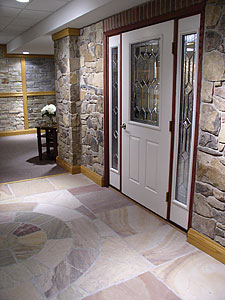
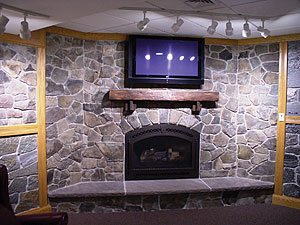
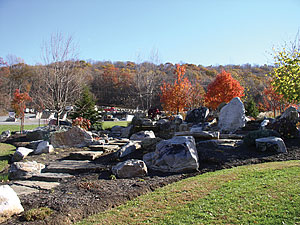
In honor of its founder, Homer Weller, Rolling Rock built a Memory Garden on its premises -- complete with different stone varieties and original quarrying tools.
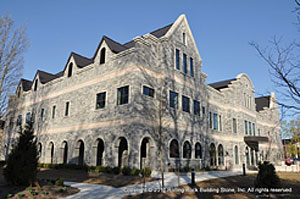
Additionally, Rolling Rock owns a limestone and a sandstone quarry near Watertown, NY, which it operates under a sister company named Greystone Quarries. Recently, the company supplied limestone for a science building at Wilson College in Chambersburg, PA, which was a match to the local Pennsylvania limestone used on existing architecture on campus. Photo copyright© 2010 Rolling Rock Building Stone, Inc. All rights reserved.

